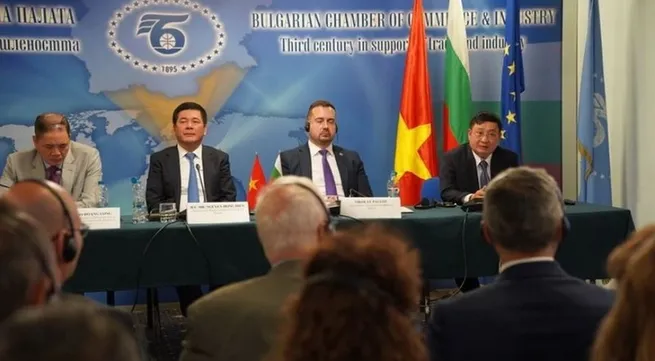Vietnam, Bulgaria look toward new height in trade volume

Minister of Industry and Trade Nguyen Hong Dien stressed that in the 1950s, Bulgaria was one of the first 10 countries globally to recognise and establish diplomatic ties with Vietnam.
Today, Vietnam stands as one of the top 40 largest economies in the world, with an annual trade turnover exceeding 700 billion USD. This economic prowess positions Vietnam among the top 20 countries with the largest international trade and the top 15 for attracting foreign direct investment (FDI), with an average annual FDI growth rate of 5-6%.
Through Vietnam, Bulgarian firms can access the ASEAN market and other international partners thanks to its entry into several free trade agreements (FTAs), he said.
He noted that recently, Vietnamese enterprises have begun investing abroad, including in European and American countries, particularly in emerging sectors such as information technology, electric vehicle production, dairy and farm produce processing. Therefore, he expressed a desire for the Bulgarian Government to offer all possible support to Vietnamese businesses to access and deepen their presence in the Bulgarian market for mutual development.
If Bulgarian businesses consider investing in Vietnam at this time, they should focus on innovation, sci-tech, digital transformation and green transition, he said.
At the 24th session of the Vietnam-Bulgaria Inter-Governmental Committee, Bulgarian Deputy Minister of Economy and Industry Nikolay Pavlov affirmed Bulgaria's attractive investment environment with special incentives for Vietnamese firms. With some 350 Vietnamese workers already in Bulgaria, labour cooperation presents a promising avenue for further collaboration, along with sectors such as agriculture, modern technology and energy.
Statistics from the Vietnamese Ministry of Industry and Trade (MoIT) showed that two-way trade neared 229.2 million USD in the first 10 months of this year, marking a 30.3% year-on-year increase. Vietnam enjoyed a trade surplus of 105.3 million USD, driven by key exports such as cotton yarn, coffee bean, natural rubber, rice, cashew nut, apparel, handbags, leather and sports shoes, computer, mobile phone, electronic components, office furniture, household plastic products and raw tobacco.
To capitalise on this momentum, the ministry encouraged Vietnamese firms to actively explore the Bulgarian market, seek partners, and promote their products. The EU-Vietnam Free Trade Agreement (EVFTA) is expected to further boost Vietnam's exports and position Bulgaria as a gateway for Vietnamese goods to enter other EU markets. Connecting with major supermarket chains like Billa and Fantastico, joining high-ranking delegations, and attending trade fairs and forums are essential steps to expand market share and popularise Vietnamese products in Bulgaria in the coming years.
Tags:





